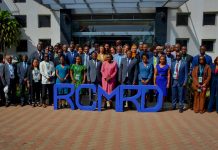By Sharon Atieno
Despite the availability of pneumococcal conjugate vaccines (PCVs)- responsible for protection against bacteria that cause pneumonia and meningitis among other diseases- many African children are still missing out, with nearly seven in 10 children vaccinated in 2024.
Surpassing all infectious diseases, Pneumonia remains the leading killer of young children, at 2,000 lives daily. The highest incidences occur in South Asia and West and Central Africa.
According to Gail Rodgers, Deputy Director, Pneumonia and Pandemic Preparedness, Gates Foundation, reaching these children is an urgent priority.
“Childhood PCV vaccination – part of routine immunization programs in most African countries – is the most effective way to reduce serious illness and death from pneumonia. Vaccinating children not only protects them directly, but also reduces transmission within communities, indirectly protecting adults and older populations,” Rodgers said at the sidelines of the Innovation and Action for Immunization and Child Survival Forum. The Forum is taking place in Maputo, Mozambique, from 22-24 July 2025.
Besides children, pneumonia also has a significant health burden on adults, killing at least 200,000 people in sub-Saharan Africa annually.
“The most significant impact on disease reduction—including in adults—is achieved by vaccinating children. This approach provides direct protection to children at the most vulnerable stages of life and reduces overall transmission—providing indirect protection to adults through herd immunity,” she reiterated.
The pneumonia vaccine is available in 42 African countries – 34 of them supported by Gavi, the Vaccine Alliance, which has worked with governments to introduce PCVs into their national immunization schedules. Within the past year, Chad, Somalia and South Sudan became the latest countries to take this step.
Rodgers observed that a lot of effort at the country and global levels is underway to ensure that children get the PCVs when they need them the most. Gavi’s Pneumococcal Advance Market Commitment (AMC) has helped deliver over 160 million doses of PCVs to low- and middle-income countries since its establishment.
Newer, lower-cost vaccines like PNEUMOSIL – available to Gavi-supported countries at $2 per dose – are helping ensure more children benefit from life-saving protection.
Importantly, she noted that the World Health Organization (WHO)’s Strategic Advisory Group of Experts (SAGE) recently recommended a reduced-dose schedule – a primary dose followed by a booster, rather than three doses – in countries with high immunization coverage.
“By reducing the number of doses needed, countries can lower vaccine and delivery costs, streamline logistics, and free up health worker time, making it easier to reach more children,” she added, noting that the ongoing Forum is an exciting opportunity to discuss advancing its scale-up with country partners.
According to Rodgers, advancements in maternal immunization offer a pathway to protect newborns and infants from other major causes of pneumonia. For example, the WHO recently recommended maternal Respiratory Syncytial Virus (RSV) vaccination to address a leading cause of pneumonia mortality in infants less than six months of age.
Also, a promising Group B Streptococcus (GBS) vaccine candidate – which has the potential to protect infants from serious infection that can lead to high rates of morbidity and mortality – is in development and could offer additional protection when administered to pregnant women.
“The Gates Foundation is committed to supporting the development and equitable introduction of these innovations, with the goal of ensuring they reach the children and communities that need them most,” she said.





